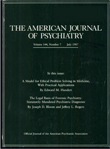Depression Among Cocaine Abusers in Treatment: Relation to Cocaine and Alcohol Use and Treatment Outcome
Abstract
OBJECTIVE: The authors investigated the theoretical and clinical role of depression among cocaine abusers in treatment. METHOD: Eighty-nine cocaine-abusing patients underwent 2 weeks of substance abuse treatment. Posttreatment major depressive disorder, depressive symptoms before and after substance abuse treatment, and alcohol diagnoses were assessed and their relation to pretreatment substance use, cravings in high-risk situations, and 3-month follow-up status was examined. RESULTS: High rates of major depressive disorder were found but were unrelated to pretreatment substance use. The decrease in depressive symptoms during treatment was independent of major depressive disorder or alcohol diagnoses and predicted treatment attrition. Higher levels of depressive symptoms during treatment were associated with greater urge to use cocaine, alcohol, and other drugs in high-risk situations. Concurrent major depressive disorder and depressive symptoms did not predict cocaine use at follow-up. However, patients who had an alcohol relapse episode experienced more depressive symptoms during treatment than did those who abstained. CONCLUSIONS: The results highlight the relationship of depression to alcohol use among cocaine abusers and suggest a need for further studies of the association between depression and substance use disorders. (Am J Psychiatry 1998; 155:220–225)



